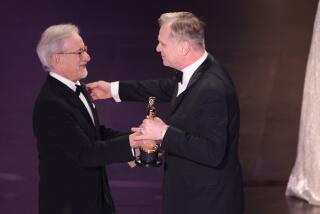‘Act of Killing’s’ Joshua Oppenheimer wins MacArthur ‘genius grant’

- Share via
Joshua Oppenheimer, the director of the acclaimed Indonesian genocide documentary “The Act of Killing,” has been named a member of the 2014 class of MacArthur Fellows.
He joins five other arts figures in receiving the honor, which is commonly known as a “genius grant” and comes with a prize of $625,000.
In handing him the award, the MacArthur Foundation noted Oppenheimer’s flair for “illuminating the social, psychological, and emotional dimensions of controversial subjects, such as state-sponsored violence, in works that challenge the modern aesthetic of contemporary documentary cinema in both intimacy of focus and visual construct.”
Oppenheimer is part of a class that also includes Alison Bechdel, the acclaimed cartoonist who is known in movie circles for coining the so-called Bechdel Test for substantive female characters on screen.
Oppenheimer has spent more than a decade working on “Killing” -- his feature doc debut -- as well as a recently completed follow-up. Reacting to the MacArthur news, the filmmaker said in an email, “This is astounding news, and it comes at the best possible time. After a decade excavating the present-day legacy of the Indonesian genocide, the MacArthur fellowship will allow me to find the courage to dive in to something wholly new -- with the freedom, wildness, depth, and focus necessary for exploring uncharted waters.” His next project is not yet known.
The MacArthur prize is considered among the most prestigious grants in the country. There is no application processes nor any known criteria; grants instead go to people doing groundbreaking work across a variety of disciplines.
Oppenheimer is considered an innovator in the documentary form. The U.S. born, Denmark-based filmmaker, 39, is best known for “Killing,” a 10-year project that examines the purge of an estimated 500,000 suspected Communists by the so-called Pancasila Youth paramilitary movement in 1965-66 Indonesia, an event that preceded the long reign of the controversial Suharto.
Rather than use conventional methods such as talking heads or extensive archival footage, Oppenheimer focuses on a number of people who conducted the purges as they re-enact them in the modern day, following their activities in a chillingly fly-on-the-wall manner. Many of the people he centers on, particularly main character Anwar Congo, are far from remorseful about their past actions and at times even seem to glorify them.
“I realized quickly I wasn’t getting sober introspection,” Oppenheimer told The Times in 2012 of his decision to film re-enactments instead of interviews. “I was getting performance.”
After garnering heavy acclaim on the festival circuit beginning in 2012 both for its formal and moral boldness, the movie went on to land on many critics’ top-10 lists and was nominated for an Oscar for best documentary feature in 2014.
Oppenheimer also just finished “The Look of Silence,” the follow-up to “Killing.” Premiering at film festivals in Venice and Toronto several weeks ago -- and, like “Killing,” set for commercial release from Drafthouse Films -- the new movie focuses on the same time period but shifts its lens to the victims of the purge. Reviews thus far have been very enthusiastic, with Variety calling it “an altogether stunning companion piece” that nonetheless retains the previous film’s “ornate moral complexities, keen sociological shading and occasional, devastating jabs of humor.”
More to Read
Only good movies
Get the Indie Focus newsletter, Mark Olsen's weekly guide to the world of cinema.
You may occasionally receive promotional content from the Los Angeles Times.










